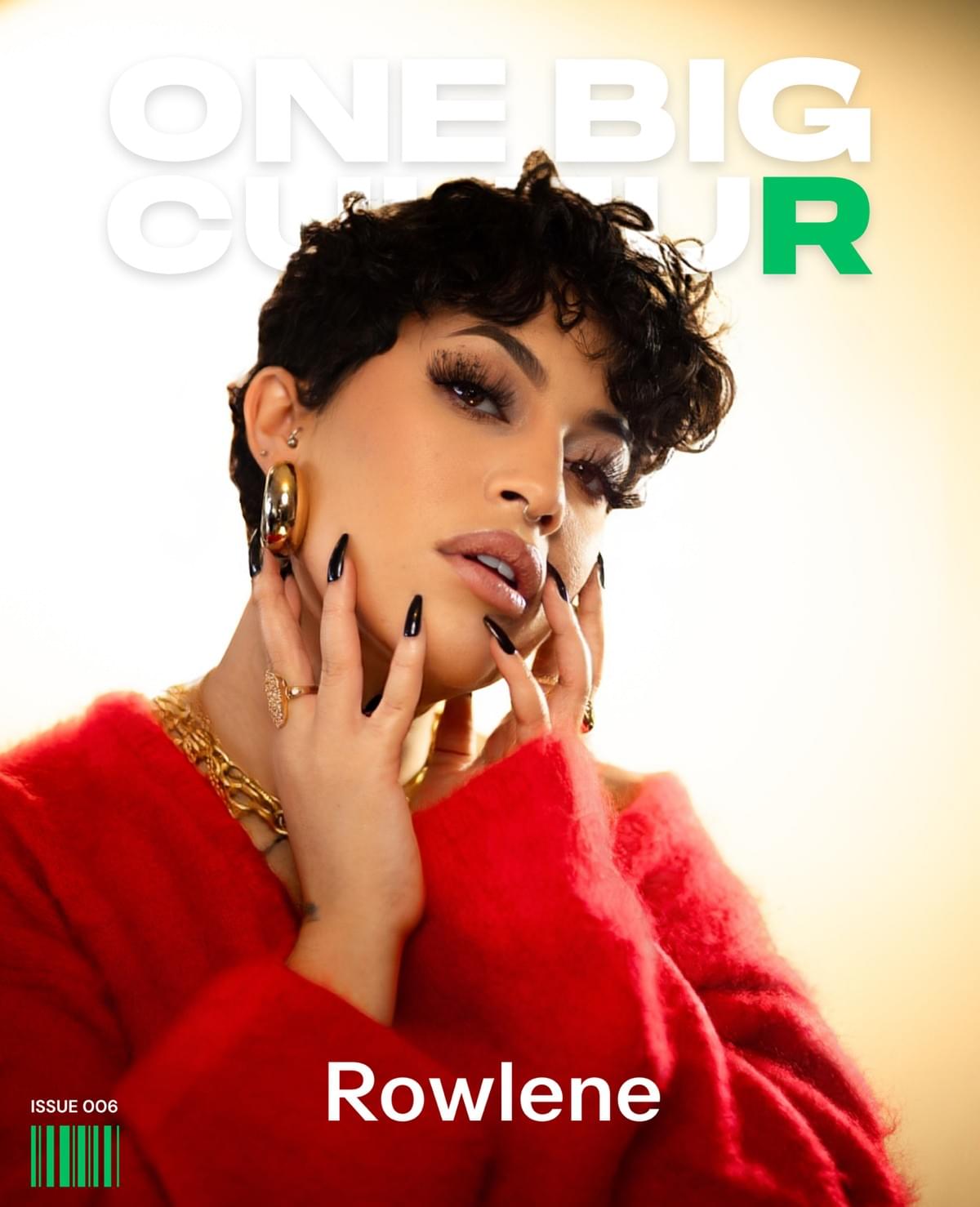
Published by Reynolds Mark
Welcome to One Big Cultur, where we explore the creative forces shaping our world. Today, we have the exciting Rowlene joining us. From heartfelt R&B melodies to lyrics that feel like late-night conversations with your soul, Rowlene has mastered the art of vulnerability in sound. In this candid sit-down, the South African singer-songwriter opens up about the personal stories behind her music, her upcoming EP, and the journey that led her to carve out her own space in the industry, from moving out at 17 to writing songs that feel like hugs. Rowlene’s story is not just about music, it's about freedom, growth, and healing.
Reynolds: You’ve had quite an inspiring journey in the music industry, especially being discovered by Nasty C. Can you take us back to that moment when you first connected with him? How did that change the course of your career?
Rowlene: Meeting him was surreal because I had just started taking music seriously. A friend connected me with him and his manager because they felt like there was something there. He had just started dropping music, I think he was on his second single, and his mixtape had just come out.
At the time, I wasn’t even fully aware of what he had already achieved, because I wasn't really into hip hop or rap. I grew up listening to old-school music and gospel. We became friends first, and we had so much in common when it came to musical taste. He loved something Lil Wayne was doing, part of the whole YMCMB movement, and we were fascinated by how each artist had their own lane. We used to talk about how cool it would be to establish something like that in South Africa.
We had big dreams, and I’m happy that a lot of the things we talked about, we’ve actually done. The collaboration between us felt effortless. Once we built a connection, we naturally started writing and recording music without any specific direction. The music was the most important thing for us; the rest, like marketing and PR, felt secondary.
We recorded a track called Particular, which ended up being one of his biggest songs. Originally, it was for Major League, but eventually, it ended up with Major Lazer. It’s wild how that all happened. We also recorded SMA and Phases around the same time I think that was about eight years ago.
But for a while, those songs just sat on his hard drive. We loved listening to what we created more than putting it out because releasing music comes with a lot of scrutiny, and we weren't ready for that yet. Eventually, we thought, why not start a label? That’s when Select Play came in, and we became this tight-knit camp, helping each other. It was amazing for our music, but we isolated ourselves a bit too much, which had its downsides.
Still, everything felt natural and unforced. When SMA dropped, four years after it was made it completely changed the trajectory of my career. Phases and collaborations with artists like A-Reece helped too, but SMA was a turning point. Even now, it still streams crazy numbers monthly. That’s what happens when things are organic and we aren't attached to the outcome. We just made a great song and moved on to the next.
That song made me take myself more seriously. It turned music from a passion into something I started treating like a job. There are so many layers to it it's difficult, but fun. As they say, in this industry, you’re constantly paying school fees. It feels like there’s a new syllabus every day! But I wouldn't change a single thing. I believe everything happens for a reason it’s about timing and what you do with it. I could’ve easily said no to meeting him, but I stayed open-minded, and I’m so glad I did.
Reynolds: Your sound blends R&B, soul, and a bit of hip hop. How did you develop that unique style? Were there early influences or moments that shaped your musical identity?
Rowlene: A lot of my sound comes from the music I grew up listening to. It's such a cliché answer, but it’s true. The melodies I come up with they feel like they’ve existed before, like they’re energy that's been repurposed in some way.
My experiences influence my writing, especially my perspective. I think I’m a sad girl most of the time, and then one happy moment can inspire songs for years! It's all about channeling different parts of my life, from childhood to now. That’s what shapes my music.
My R&B influence is rooted in gospel. My parents had very different tastes in music, so I was exposed to both. Of course, I didn’t have much choice if it was playing in the house, I had to listen. That taught me discipline in a way. And now I get to choose. I see that as getting a piece of them in my music.
When I released my early songs, people would say I sounded like Rihanna. At first, I didn’t know if that was a compliment or an insult. But over time, I realized she’s great. Why wouldn’t that be a compliment? Ego gets in the way sometimes, but I've learned that I can be different and still learn from others. Both things can be true.
Also, I love to challenge myself. In the studio, I’ll set timers trying to outwrite my last song. Maybe I wrote one in an hour, then I’ll try to do the next in 30 minutes. I track it with voice notes too. It’s a fun exercise. Artists are like athletes they train daily. So how do I train? That’s how. I walk into the studio with a concept and try to spark something that energizes everyone else in the room.
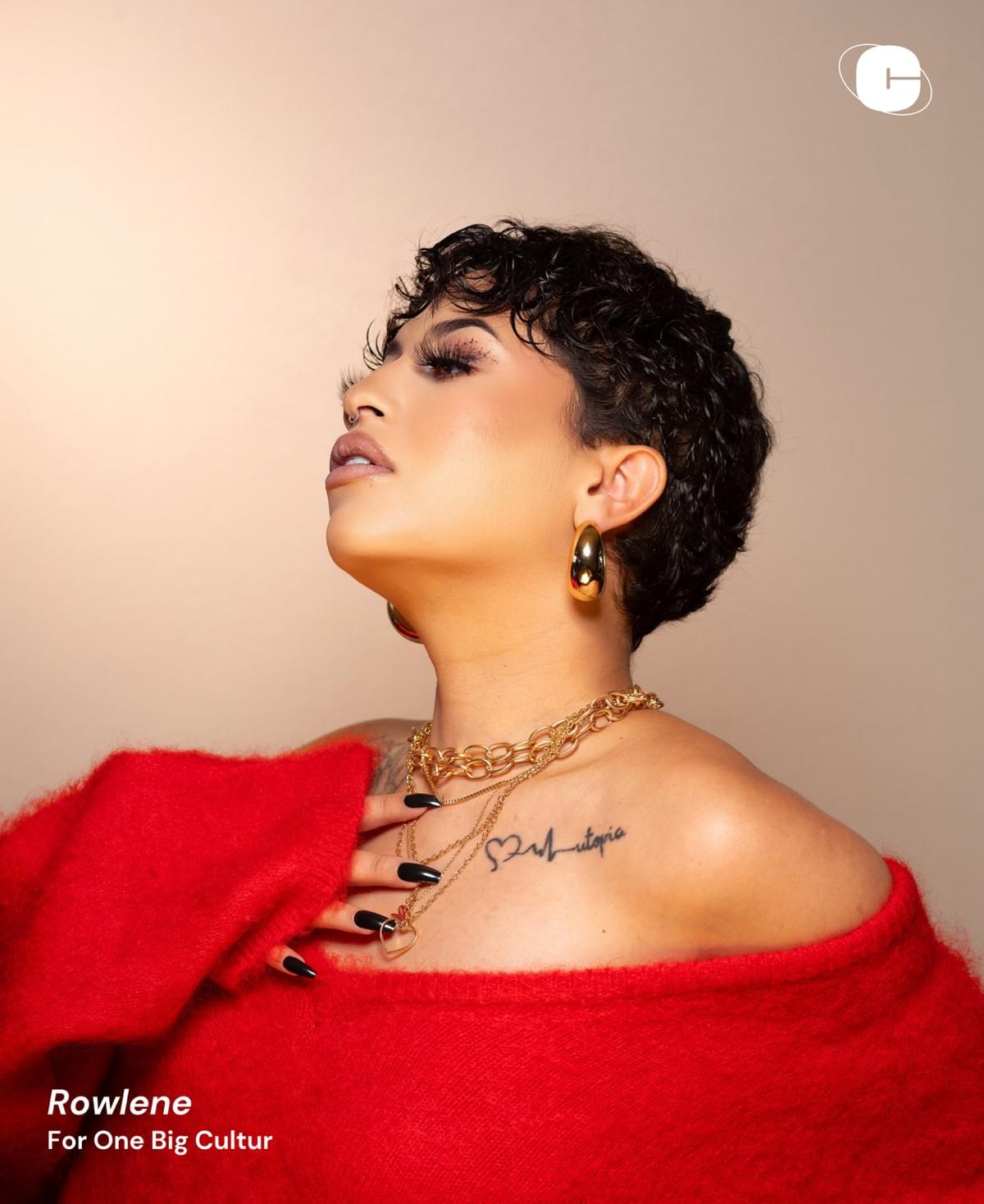
Rowlene: Definitely! I play Sudoku all day and do puzzles, basically everything I couldn't do as a kid just for fun.
Reynolds: you weren’t allowed to play those things before?
Rowlene: Yeah, not unless I had earned it like if I did something great that day. And even then, I’d only get to do it for 20 minutes before it was time for homework. Now, I just go buy a puzzle whenever I want, no permission needed.
Reynold: Yeah, that’s the good part of adulting. Honestly, maybe the only advantage they didn’t tell us about.
Rowlene: For real. It’s the only one! The rest can miss me. But, yeah, freedom is nice even if free will is questionable sometimes.
Reynold: So from your early covers on social media to now releasing full-length projects, what’s been the most rewarding part of your career so far?
Rowlene: I think it’s the skills I’ve acquired over time. That’s the most rewarding part no one can take that from you. When I started with covers, none of it was mine. I wasn’t writing yet. Now, eleven years later, I write my own music, I can produce, I can record myself.
I used to judge my early work like, “you sound so young!” But now I realize, I was supposed to sound like that. I was learning. I still am. But back then, I hadn’t even gotten into the room yet. Now I can build the room and invite whoever I want.
And while I can do it all myself, collaboration is unmatched. It’s just important that everyone is there for the same reason, with no egos. What I love most is being able to serve others too, showing someone the steps I took and giving back. I can say, “here’s what I did,” even if I can’t guarantee it’ll work for them. It’s all just fun now.
It still blows my mind that I can switch on my mic and laptop, record something, and people actually listen to it. That’s insane to me.
Reynolds: I feel that. So, as an artist from South Africa, do you feel a sense of responsibility to represent your country's musical culture? How do you balance that without compromising your own artistic direction?
Rowlene: Honestly, I’ve never tried to be anything but South African. Everything I sing about is rooted in what I’ve experienced here with people who share the same habits and culture. Sure, I’m not singing in Afrikaans or making Amapiano, but that’s not all that defines us.
We experience heartbreak in R&B too. Maybe it's not in one of our official languages, but emotions are universal. That used to be a struggle for people asking, “why don’t you do this or that?” And my answer is, “why don’t you?”
I think a lot of people who try to project their ideas onto artists are just frustrated creatives who didn’t get to pursue it themselves. That’s not fair, let me make my own mistakes. But the thing is, what I’m doing is working. Even if only seven people are listening, that's still seven people who chose my music today. That means something.
Representing my culture doesn’t mean I have to do it one way. I represent colored people, I represent R&B in South Africa. Where I’m from, people love R&B and they’ll flip it into taxi versions that bump in the hood. That's a cultural contribution too.
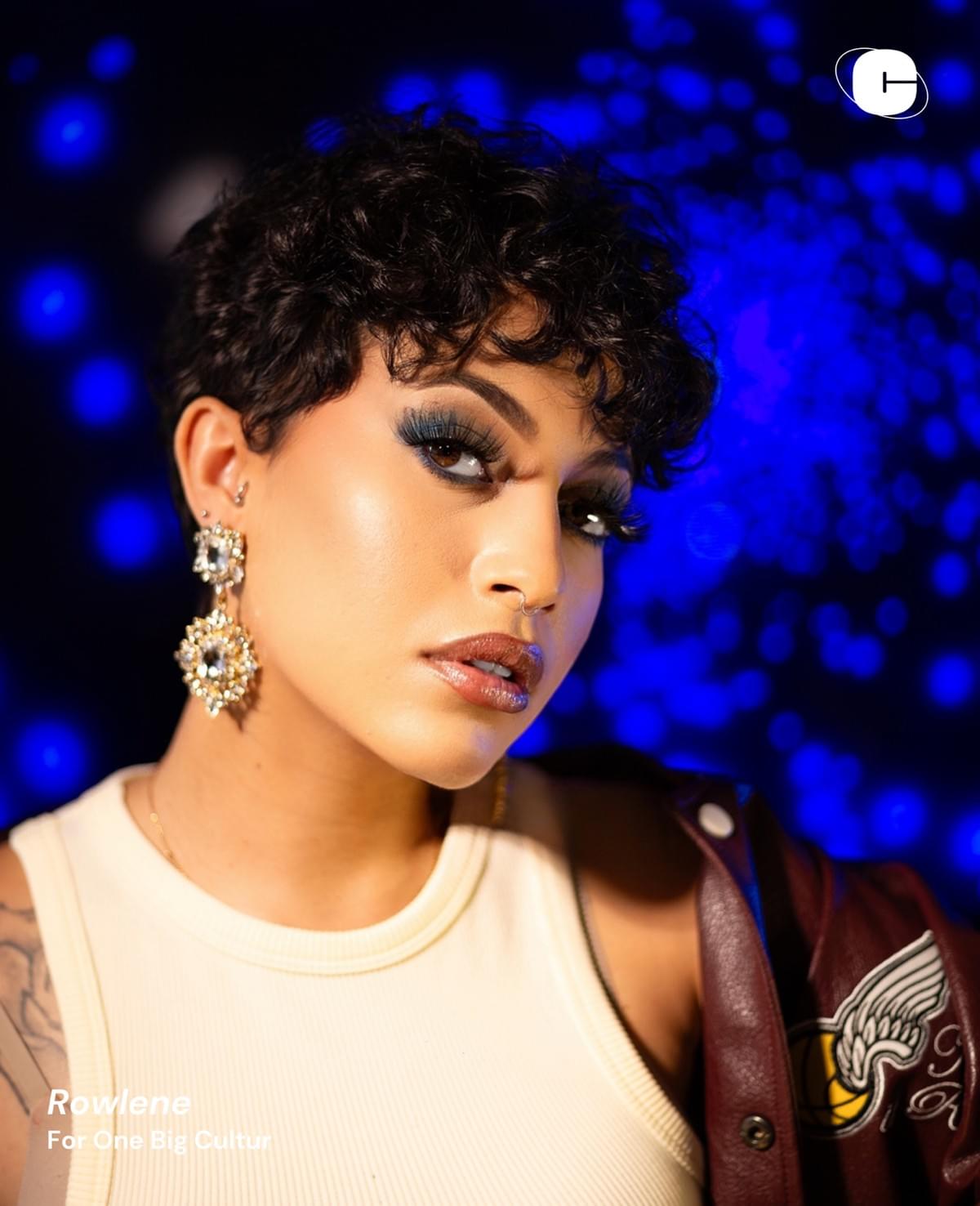
Rowlene: Honestly, I made that project during COVID or, well, it came out during COVID. We started it just before everything shut down. I remember I was doing a festival around March 7th, right after my birthday, and then everything just… stopped. The camp for the album happened three weeks before the lockdown. We didn’t have a strict plan; we just wanted to create magic. Out of the camp, three songs made the final cut “Sunday Morning,” “Stop,” and “Danger.”
The rest were born out of being stuck at home, just writing. The songs are super different from each other. Like, I listen now and go, “Damn, I could’ve done this or that better.” But it was honest. I had just signed to a label, SMA had dropped, and there were expectations of this big ticking clock I felt like everyone was watching. In the end, I picked 12 songs I really loved and just put them out. The cohesion might’ve been broken by the pandemic, but what remained was authenticity. It’s real. It’s me.
Reynolds: You’re known for blending genres, especially R&B and hip-hop, in fresh ways. How do you keep your sound evolving while staying true to your acoustic voice?
Rowlene: I try not to force anything. I usually collaborate with a lot of different people and that’s honestly one of my favorite parts of doing music. You get to cross genres, cultures, and creative energies.
Hip-hop kind of introduced me to everything. I was always doing R&B and pop, and then I found myself surrounded by hip-hop culture here in South Africa. From there, it just snowballed I met people who were moving into Afro sounds, artists like Oxlade, who blend melody and rhythm so naturally. And now I’m like, “Damn, that influences how I deliver a line, too.”
I pay close attention to energy. Music is energy, and I want mine to be timeless even if just seven people hear it in seven lifetimes. It’s why I work with people I respect, people I can learn from. I want to be inspired by who I’m in the room with, not just working for the sake of it.
Reynolds: How do you know when a song is finished?
Rowlene: When I want to drop it tomorrow! Like, when I feel that urgent excitement, I know it’s ready. But I’m also disciplined, I don’t just throw things out impulsively anymore.
Sometimes I’ll listen to a track on repeat, in the shower, wherever. And I have this one friend I send music to. He listens to everything, so if he and his whole house are vibing, I take that as a green light. It’s a short list of checks, but it works.
Reynolds: Your collaboration with Nasty C on Bad News was a standout. What was it like working with him, and how did that shape you as an artist?
Rowlene: It really pushed me. I like working with people who are better than me, because it challenges me to grow. Everyone I’ve collaborated with has been amazing at what they do undeniably so.
Nasty C made me want to record myself, write my own music, own my sound. You need people around you who run faster than you. That’s how you level up not just in music, but in life. And that energy? It makes its way into the music. That’s why people connect to it. It’s real.
Reynolds: With streaming platforms changing how we listen to music, how do you stay connected with fans, and how does it affect how you release music?
Rowlene: Honestly, it’s been harder. I used to sell CDs at my shows for cash. When streaming came in, it felt like a playground. I used to drop music every Wednesday on AudioMack, just for fun. I’ve got so many songs, my catalog is wild. Some tracks from 2014 are still being streamed.
Streaming helps you reach people you never imagined. I’ve got fans in Nigeria, the US, even Tokyo. It’s surreal. That’s why I ended up in America, I saw the numbers and was like, “Wait, people know me there?” That led to new connections, stations, and producers. It all started with someone hitting play halfway across the world.
Reynolds: What was the reception like in the US?
Rowlene: It was crazy in the best way. I got into some amazing radio stations and writing rooms. It really showed me how small the world is, how far this thing can take you if you're willing to go. I never thought I’d leave Cape Town, let alone live in Johannesburg, then London, then America. All because people were listening.
Reynolds: Outside of music, what are some of your passions or hobbies? How do you find balance?
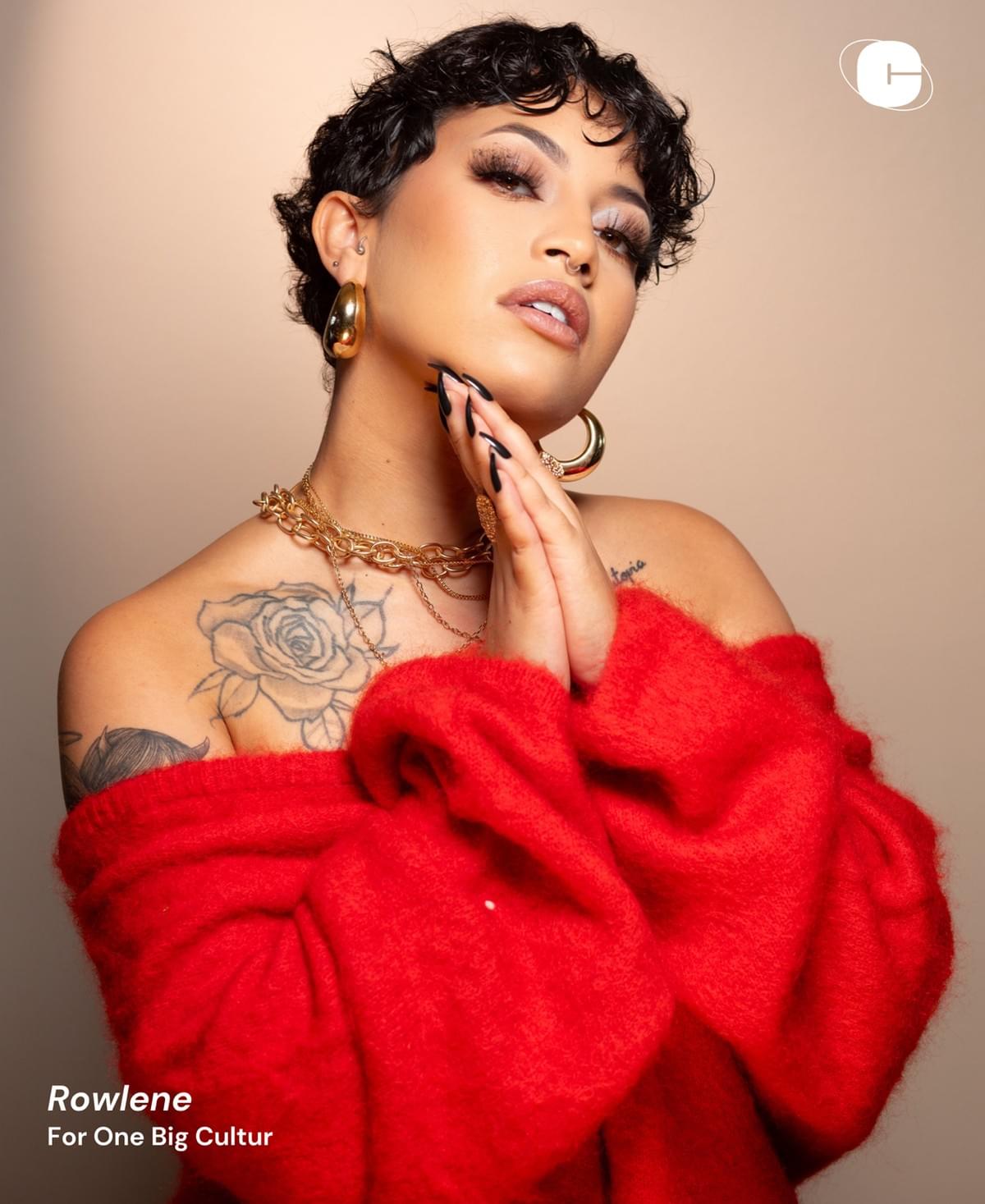
Then I’ll switch it up and just color in or build puzzles. I wake up early, I train in the morning, I try to eat well, and then sometimes I don’t because of balance! I try not to carry guilt over what the internet tells me “healthy” should look like. I'm doing my best, and that's enough.
Reynolds: If you could perform anywhere in the world, where would it be?
Rowlene: That answer’s changed a lot, but I’d love to headline Coachella. That’s the dream. Rocking the Daisies was my first big one here at home, and I did that. Now I wanna dream even bigger.
Glastonbury would be insane too. Even the Wildlife Festival. But chaos makes me anxious, so it would need to be the right chaos.
Reynolds: If you weren’t doing music, what do you think you’d be doing instead?
Rowlene: I’ve lived many lives, and I don’t see myself going back to any of them! But if not this, probably something still in music, marketing or management. Or maybe psychology. People naturally vent to me, so I might as well get paid for it.
Reynolds: Like a therapist ?
Rowlene: Yeah, you understand.
Reynolds: You've grown so much since your first single. How do you stay grounded in an industry full of highs and lows?
Rowlene: Good people. Values. That’s it. The five people closest to you shape your world, your energy. So I stay surrounded by people who keep me real, who remind me who I am and why I started. Because we're all the same. We're all going through this, we might not be going through the same shit, but the gravity of whatever we're going through is still very much validated. Because we do such different things. So it's like me talking about a publishing breach, it will mean absolutely nothing to them because they don't know what I'm talking about. But when one of my friends talked to me about, like, how something crazy happened in the market share in medical science. I don't care, but I'm listening. And I'm like, you know what? That's crazy. Where are we going, and whose house are we burning down? That's just my friendship.
Reynolds: Is there a song from your catalog that feels personal to you? What makes it so meaningful?
Rowlene: Frequency, definitely. That one’s really close to my heart. I wrote it about my best friend, she’s Kenyan, an incredible artist, and an even better writer. Her brain is just, I can’t even begin to unpack it. I was in London when I heard the beat, and within forty minutes I knew exactly what I wanted to say.
I don’t even remember what she did that day to make me feel that way, but I just felt this warmth, and I was like, “Oh my god, I wrote a song about you.” I sent it to her immediately and we both geeked out, it was so cute. It still is. But more than that, it’s honest and real. Every word in that song, I meant. And she’s shown up in all those ways for me too.
It’s not just about her, it’s a tribute to my whole circle, my friends and family. It feels like a '90s R&B song, but with real emotions, real love, real memories. It’s still fun, still vibey, but it’s got soul. That song means a lot
Reynolds: Do you have any new projects coming out soon? What can fans expect?
Rowlene: I do! I’ve got an EP dropping at the end of May, and my next single is coming out in April, probably the last Friday of the month. I might be getting the exact date wrong, but it’s definitely April. [Laughs]
And honestly? That next single might be one of my favorite songs I’ve ever worked on. I’m really excited for this rollout. Each of my projects so far has reflected a major moment in my life, and this one is no different. The next song, especially it feels like a hug. I wrote it to myself, and every time I listen to it, I get this warm feeling. Like... “Ohhh.” It’s just soft, gentle, comforting like a warm blanket wrapped around your soul.
Reynolds: If you could say something to your younger self, what would it be?
Rowlene: I’d tell her to attack the thought, not the thinker.
I used to take everything so personally, thinking everyone was out to get me. But sometimes your heart can be deceptive. Even when you’re a good person, if you’ve been hurt, you can act from that pain. And I’ve been through a lot. My younger self carried so much. So I'd just tell her, “Keep going. Don’t stop.”
I wouldn’t change a thing. I moved out at 17, that was a huge step. But now, I live in my own apartment, I make music whenever I want. I wouldn’t be here without taking those risks
Reynolds: Why did you decide to move out so young?
Rowlene: Honestly? Everyone at home felt so stuck. My family’s a very traditional coloured family. They’re supportive, don’t get me wrong, but the way they show support can be really toxic sometimes.
I looked at my mom’s choices, how she raised us, and I realized I didn’t want to repeat that cycle. I needed to do something different. So I jumped into the deep end, no plan, just faith.
I knew I wasn’t born just to exist in that space. My mom still lives with her mom, and while there’s so much love there, it’s also a bit much. Everyone’s in each other’s business all the time. And while that closeness works for some people, I wanted the option to leave, to breathe, to grow on my own terms.
Now, I still show up for my family, I love them. But I get to choose how and when. I get to make my own decisions. And that’s been everything. I’ve been doing this for ten years now... and it’s been great.
Reynolds: That was such a lovely story. Thank you for sharing that.
Rowlene: I hope I get to read this and just laugh and be like, “Wow, that’s crazy.”
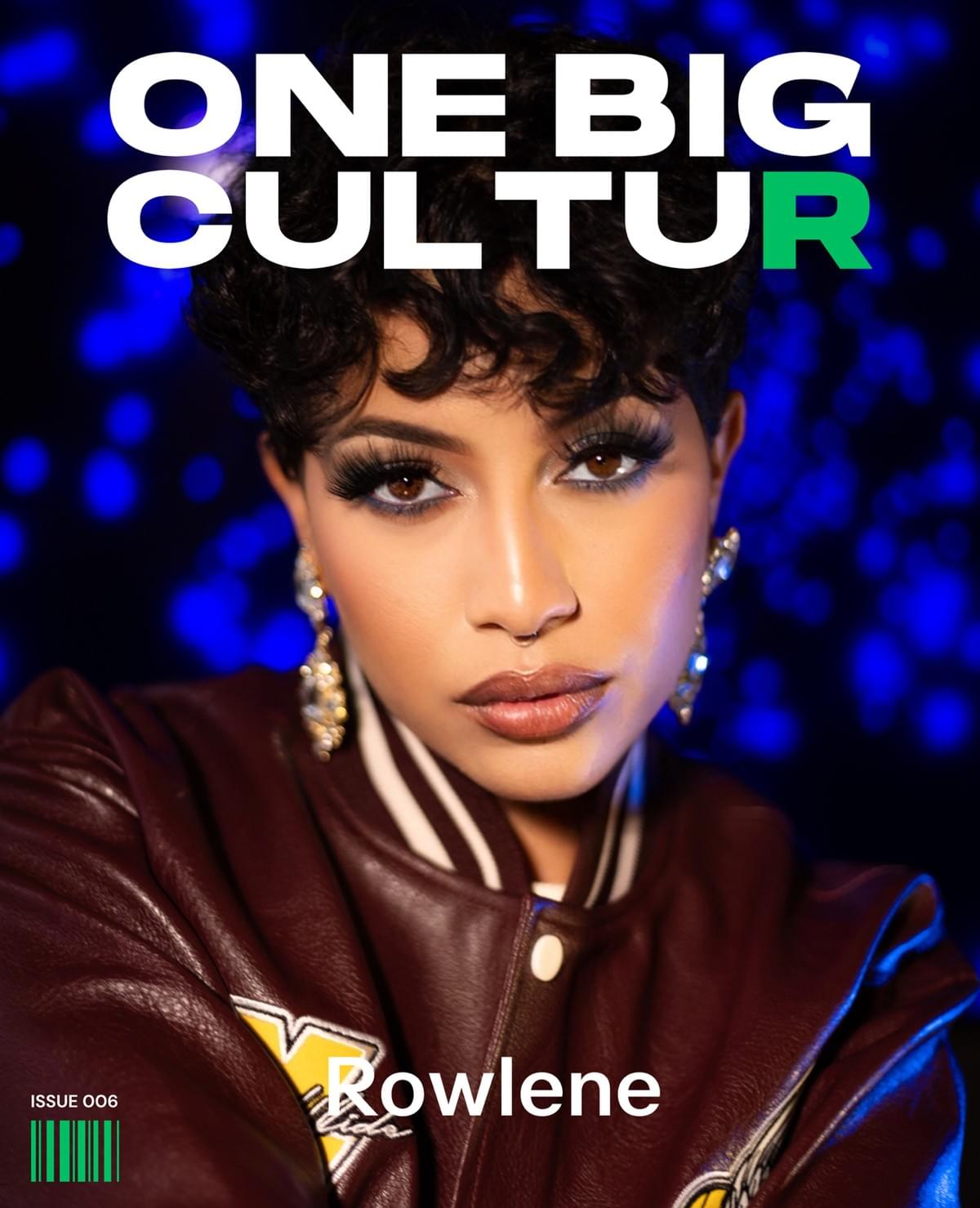
Rowlene’s journey is a reminder that music, at its core, is a reflection of life’s realest moments, love, independence, friendship, and healing. As she steps into a new chapter with her upcoming EP and warm, soul-soothing singles, one thing is clear:
she’s doing it her way, one honest lyric at a time. And as fans, we’re lucky enough to witness her becoming.
Editor in chief / Interviewed
by Reynolds Mark
Project lead Oliwia Klimzcak
Head of design
Assitant editor
Co-ordinated
Styled
photographed
